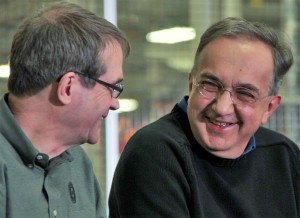
FCA CEO Sergio Marchionne (r), with outgoing UAW Pres. Bob King at the Sterling Heights, Michigan, plant recently. Marchionne said he wants to open UAW contract talks next month: a year early.
The ongoing saga of recalls from General Motors is having a spillover effect on the competition: FCA CEO Sergio Marchionne said he’s bringing in outside consultants to examine the company’s recall practices.
Speaking to reporters after an event at the Brookings Institution, Marchionne said that he’s beginning to see a new level of attentiveness by Chrysler executives when it comes to safety.
“It can’t be that all of a sudden we woke up and we realized we had these issues, so there must be a change in attitude,” he said, according to the Detroit News. “We’re beginning to see people getting truly, truly cautious.”
The consultants’ role is “to look at the Chrysler process itself to find out whether we can improve it — we’re going to benchmark it against other (automakers.) We’re going to try and take a look to see whether we’re doing all the right things,” he told the News.
The industry is on torrid pace for recalls. The record for recalls is 30.4 million vehicles, which happened in 2004. Just five months into this year, more than 20 million vehicles have been subject to recall. GM accounts for 13.7 million of those.
However, Marchionne also stressed he would not be involved in recall decision at Fiat Chrysler because of a potential conflict of interest, an issue faced by every automaker.
“The chances of my involvement are zero to none,” he said. “There is no way an executive with P&L responsibility should involved. That assessment needs to be made by technical people.”
In addition to closely examining its recall processes, Marchionne wants to examine its contract with the UAW, and he’s planning to do that starting next month after Dennis Williams is elected the next president of the UAW the union’s constitutional convention in Detroit, which is a year before the current labor agreement expires.
(Nissan changes the “golden” rule with the new GT-R. For more, Click Here.)
“Now that we are going to have a change … I think we are going to start discussions right now,” Marchionne said, according to the News, adding he didn’t know if that would result in an earlier deal.
One topic sure to get some attention is the current two-tier wage system, which Marchionne sees as untenable. He said it was unreasonable for one person to get paid half of what another person does for the same job. Currently, new UAW members at Chrysler get a starting pay of $15.78 per hour. It tops out at just over $19 an hour. Union employees hired before 2007 average $28 per hour.
The Chrysler chairman also said he was confident Chrysler will make its ambitious production targets for this year and down the road.
“I always worry about bottle necks but 2014 is in the bag,” he said. He also said he has not had any second thoughts about the ambitious production and sales targets he laid out for analysts. “I’ve had no second thoughts.”
(Click Here for details about Toyota’s plan to improve its hybrid mpg.)
Despite his proclamation, he did concede the ambitious targets for Alfa-Romeo, which hasn’t sold a vehicle in the U.S. in nearly two decades, are certainly the most challenging. However, they are critical to FCA’s objective of selling more premium vehicles.
It also was one of the reasons Marchionne traveled to Homer, 100 miles west of Detroit to help dedicate an expansion of plant operated by Brembo, the Italian brake specialist, which supplies components to high-performance cars built by brands such as Porsche and Audi. Brembo is also a key supplier to FCA, Marchionne noted.
FCA’s growth targets call for the automaker to boost sales by 40% by 2017 to seven million units, including 150,000 Alfa-Romeos to customers in the U.S.
(To see TDB’s first drive in the new 2015 Subaru Legacy, Click Here.)
The bold predictions had surprised analysts. Stephanie Brinley, an analyst with IHS Automotive, said it would be difficult for FCA to meet Marchionne’s objectives.
Even John Elkann, the youthful heir to the Italian industrial fortune that controls FCA and serves as the company’s chairman, told reporters he thought the goal might be overly optimistic and tried to persuade Marchionne to be more cautious. “With most boards, it’s the other way around,” he said, noting it is usually board members pushing for ambitious objectives while operating managers are more cautious.
Joseph Szczesny contributed to this report.

Given this business with GM, I don’t blame Marchionne for reviewing FCA recalls. Indeed, I think it’s a good idea on his part. Vehicle quality can always be improved.